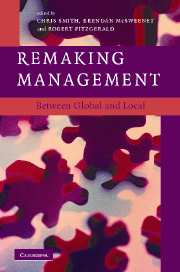Book contents
- Frontmatter
- Contents
- List of tables
- Notes on contributors
- 1 Remaking management: neither global nor national
- Part I Conceptualising International and Comparative Management
- Part II Systems in Transition
- Part III Society as Open and Closed
- Preface: Society and comparative differences
- 8 Capitalism and Islam: Arab business groups and capital flows in south-east Asia
- 9 Challenges to the German theatrical employment system: how long-established institutions respond to globalisation forces
- 10 Between the global and the national: the industrial district concept in historical and comparative context
- 11 Transnational learning and knowledge transfer: a comparative analysis of Japanese and US MNCs' overseas R&D laboratories
- Part IV The Search for Global Standards
- Index
11 - Transnational learning and knowledge transfer: a comparative analysis of Japanese and US MNCs' overseas R&D laboratories
Published online by Cambridge University Press: 06 July 2010
- Frontmatter
- Contents
- List of tables
- Notes on contributors
- 1 Remaking management: neither global nor national
- Part I Conceptualising International and Comparative Management
- Part II Systems in Transition
- Part III Society as Open and Closed
- Preface: Society and comparative differences
- 8 Capitalism and Islam: Arab business groups and capital flows in south-east Asia
- 9 Challenges to the German theatrical employment system: how long-established institutions respond to globalisation forces
- 10 Between the global and the national: the industrial district concept in historical and comparative context
- 11 Transnational learning and knowledge transfer: a comparative analysis of Japanese and US MNCs' overseas R&D laboratories
- Part IV The Search for Global Standards
- Index
Summary
Introduction
Multinational corporations are unique knowledge-creating organisations, because of their structural position spanning diverse institutional contexts and their ability to transfer knowledge across national borders (Kogut and Zander, 1993, 1995; Gupta and Govindarajan, 2000). Recent research has emphasised the learning and knowledge-creating aspects of foreign direct investment, and the growing importance of networks of foreign subsidiaries as new sources of competitive advantage (Frost and Zhou, 2000; Birkinshaw, 1997; Frost, Birkinshaw and Ensign, 2002). In the past, the ways in which the MNC created value from knowledge was conceptualised as a linear process of knowledge diffusion from the home country to the overseas unit. More recent theoretical and empirical research on MNCs recognises increasingly that knowledge creation occurs not only at the home base but in all the firm's far-flung dispersed units (Nohria and Ghoshal, 1997; Frost, 2001). The MNC is increasingly recognised as an international knowledge network that creates, integrates and applies knowledge in multiple locations (Almedia, Song and Grant, 2002; Subramaniam and Venkatraman, 2001). Especially in the science-based high-technology sectors, one notable recent trend has been the extension of firms' research and development activities and competence portfolios on a global scale to augment their knowledge base and to gain access to unique human resources (Howells, 1990; Florida, 1997; Kuemmerle, 1997). It has been noted that one of the main changes in the innovation strategies of MNCs since the early 1990s has been the move towards ‘international learning companies’, and the utilisation of overseas laboratories as ‘knowledge incubators’ to generate new scientific knowledge that can underpin their technological distinctiveness (Meyer-Krahmer and Reger, 1999; Pearce and Papanastassiou, 1999; Lehrer and Asakawa, 2002, 2003).
- Type
- Chapter
- Information
- Remaking ManagementBetween Global and Local, pp. 292 - 330Publisher: Cambridge University PressPrint publication year: 2008
- 2
- Cited by



